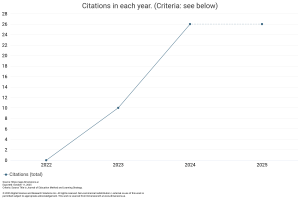Analysis of Learning Difficulties in Class V Elementary School Science Material
DOI:
https://doi.org/10.59653/jemls.v2i01.369Keywords:
Analysis, Science, Learning DifficultiesAbstract
The aim of this research is to identify problems in studying science material and the factors that contribute to these problems. This type of research is qualitative and uses a descriptive approach, involving the use of interviews, questionnaires and documentation. The results showed that six students experienced difficulties in learning science. Internal factors that influence science learning difficulties include poor health, physical disabilities, poor intelligence, students' low interest in learning, and lack of motivation to learn. External factors that contribute to difficulties in learning science include parents' less effective educational styles, parents' lack of attention to students' learning activities, poor relationships between parents and children, weak discipline, a home atmosphere that interferes with students' concentration while studying, and the negative influence of the media and friends who do not support a learning culture. The research results show that teachers must provide incentives that can increase students' interest in learning and must be able to find learning problems in the classroom. Parents must monitor their child's learning progress both at school and at home.
Downloads
References
Concerned, Siti. 2015. Teachers' Efforts to Increase Student Learning Motivation. UM Metro Economic Education Journal. Vol. 3 No. 1
Dalyono, M. 2010. Educational Psychology. Jakarta: PT Rineka Cipta
Hidayat, Sharif. 2013. The Effect of Parent and Teacher Collaboration on Student Discipline at School State Junior High School (SMP) Jagakarsa District-South Jakarta. WIDYA Scientific Journal, Vol. 1 No.2
Hurit, Andreas Au and Diah Harmawati. 2019. Analysis of Teacher Readiness to Implement K13 curriculum at SD Inpres Gudang Arang Merauke. Journal Of Primary Education.Vol. 1 No. 2
Idris, Zahara. 1986. Basics of Education. Padang: Angkasa Raya
Moleong, Lexy J. 2017. Qualitative Research Methodology. Bandung: PT Teen Rosdakarya.
Muhibbinsyah. 2010. Educational Psychology. Bandung: Rosdakarya Youth.
Nisa, Afiatin. 2019. The Influence of Parental Attention and Student Interest in Learning on Achievement Study.
Olubunmi, G., & Kolawole, A. (2023). Secondary School Student’s Academic Performance Self Esteem and School Environment: an Empirical Assessment from Nigeria. Journal of Education Method and Learning Strategy, 1(03 SE-Articles), 126–135. https://doi.org/10.59653/jemls.v1i03.170
Rigianti. 2020. Obstacles to Online Learning for Elementary School Teachers in Banjarnegara Regency. Elementary School 7. 297-302, 301. 2020.
Sugihartono. 2007. Educational Psychology. Yogyakarta: UNY Press.
Suharjo, Drajad. 2003. Research Methodology and Scientific Field Research. Yogyakarta: UII Press
Sukmadinata, Nana Syaodih. 2005. Psychological Foundations of the Educational Process. Bandung: Teenagers Rosdakarya.
Tambak, Syahrani. 2016. Storytelling Method in Islamic Religious Education Learning. AlThoriqah Journal. Vol. 1 Zero. 1
Wahira, W., & Hamid, A. (2023). The Role of School Accreditation in Improving the Quality of Graduates. Journal of Education Method and Learning Strategy, 1(02 SE-Articles), 52–58. https://doi.org/10.59653/jemls.v1i02.54
Wahyuni. 2018. Analysis of Student Learning Difficulties in Science Subjects in Class VII of SMP Negeri 4 Big Terbanggi. Journal of Science and Technology
Widiantari, Ni Ketut Maha Putri, et al. 2015. Analysis of Class IV Students' Critical Thinking Abilities in Mathematics Learning. E-Journal PGSD Ganesha University of Education. Vol. 4No. 1
Downloads
Published
How to Cite
Issue
Section
License
Copyright (c) 2023 Marsella Desriyarini Gui, Mohamad Akuba

This work is licensed under a Creative Commons Attribution-ShareAlike 4.0 International License.
Authors who publish with this journal agree to the following terms:
- Authors retain copyright and grant the journal right of first publication with the work simultaneously licensed under a Creative Commons Attribution-ShareAlike that allows others to share the work with an acknowledgement of the work's authorship and initial publication in this journal.
- Authors are able to enter into separate, additional contractual arrangements for the non-exclusive distribution of the journal's published version of the work (e.g., post it to an institutional repository or publish it in a book), with an acknowledgement of its initial publication in this journal.
- Authors are permitted and encouraged to post their work online (e.g., in institutional repositories or on their website) prior to and during the submission process, as it can lead to productive exchanges, as well as earlier and greater citation of published work (See The Effect of Open Access).
























